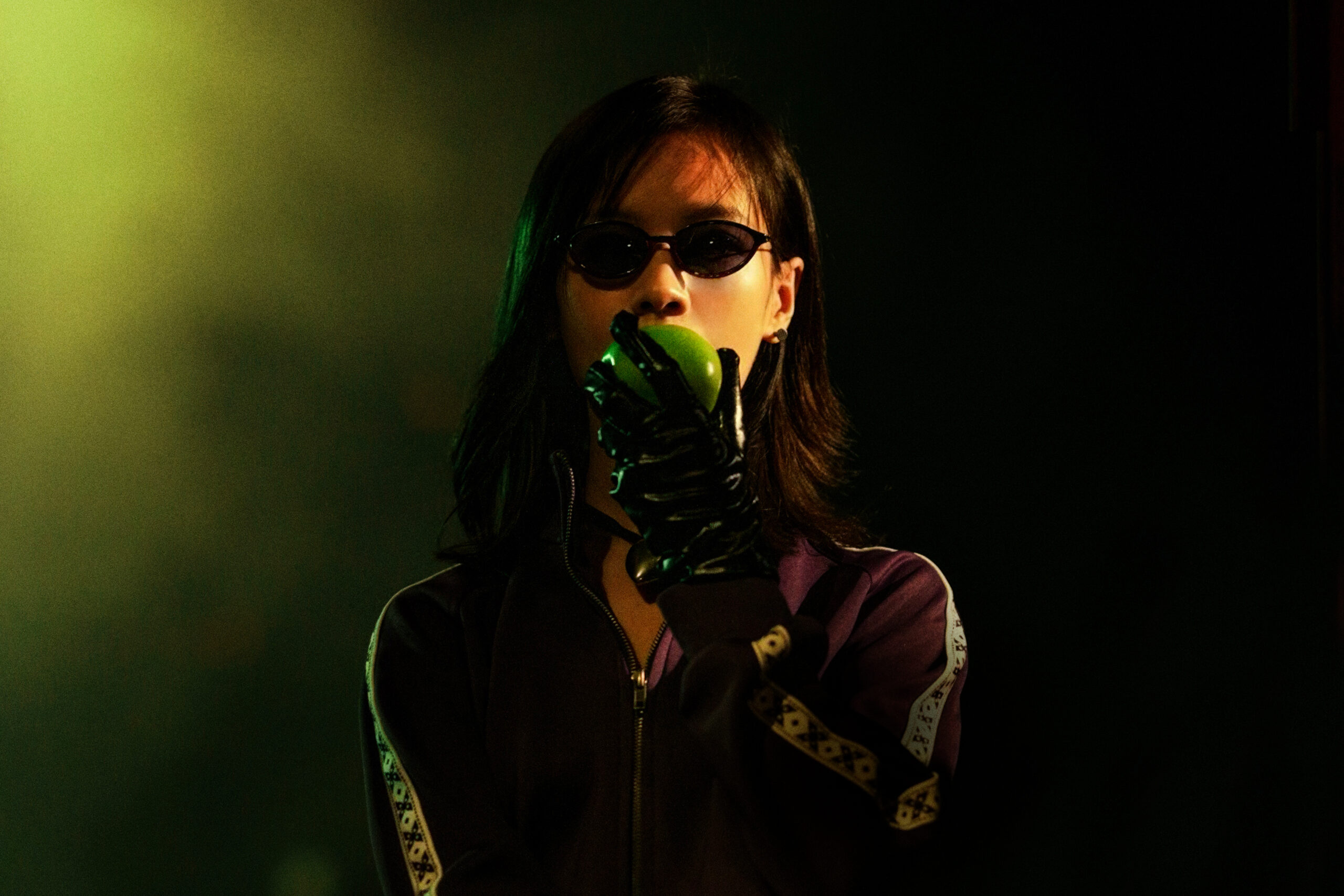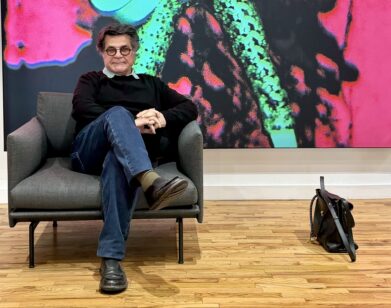NYFF
Filmmaker Bi Gan Joins Jeremy O. Harris in the Criterion Closet

Bi Gan, photographed by Jeremy O. Harris.
MONDAY 4:06 PM OCTOBER 6 2025 GRAMERCY
Where might you find director Bi Gan in the middle of the New York Film Festival? At the movie mecca that is the Criterion Closet, surrounded by decades of cinema history. This week, the Chinese filmmaker is in town for the NYFF premiere of his new feature Resurrection, a film that drifts between the surreal and the everyday to pose the question: Could you imagine a world where humans lost the ability to dream? To mark the occasion, Gan opened up to Interview‘s consigliere and resident movie buff Jeremy O. Harris about astrology, algorithms, and the dreamlike logic that fuels his cinema.
———
BI GAN: If you do visit Beijing, look me up.
JEREMY O.HARRIS: I will. Let’s exchange numbers after this. I would love to hang out. Do you know Interview Magazine, the magazine I work with?
GAN: Interview…
HARRIS: It was started by Andy Warhol.
GAN: Ah, yes. I know.
HARRIS: It’s a very relaxed magazine, so we’re going to talk about your movie, but I also just want to talk to you. You can free yourself.
GAN: Yeah. Interview is more relaxed.
HARRIS: You know we have something in common. I’m born June 2nd, 1989, and you’re June 4th.
GAN: Yeah, yeah, yeah. Gemini?
HARRIS: Yeah, I’m a Gemini. Do you follow the Chinese Zodiac and the Zodiac that I follow?
GAN: Mm-hmm. Personally, I’m not really into that, but usually when we’re eating and hanging out, people will start talking about zodiac signs. So I’m pretty familiar with that.
HARRIS: We’re the year of the snake.
GAN: Yes. This is a very good year for snakes.
HARRIS: Oh, it is?
GAN: Yeah.
HARRIS: What’s good about snakes this year?
GAN: So it’s sort of a round, full cycle of the snake zodiac. It means that this is the year that is your destiny.
HARRIS: Oh, great.
GAN: You know, you run the first cycle of 12 years, and this is where everything comes full circle.
HARRIS: That’s amazing. Apparently it’s a really good year for Geminis as well. Something’s going into Pluto, which is the destroyer planet, so a lot of paradigms are being upended. And we’re about to have these new sort of subconscious revelations because it’s the dark planet, the planet of the subconscious, which made me think a lot about your film.
GAN: Yes. Zodiac signs, films. They’re all interconnected.
HARRIS: Yeah. What do you think drew you to thinking about your subconscious for this movie?
GAN: For me, I observe what’s going on in Beijing, in Guizhou, and I have seen that reality has become so unreal and so surreal. For example, in Chongqing now they’re testing driverless fleets in the street. So, I sort of joke about this with the interpreter, that more and more people are so careful with what they eat. They will talk about proteins, they will talk about carbs, and you have different carbs. You have the fast-acting carbs, you have the slow-acting carbs, and then you also talk about the kind of oil that you use to cook. You have the high smoke point oil, the low smoke point oil, but in the same breath as they’re talking about this, they’re opening up a bag of junk food while on their phone, and just mindlessly consuming the kind of technology that surrounds them. How can you treat your body in such a way that you’re trying to be as healthy as possible, and at the same time still treating your brain and your mind in such a careless way? It’s almost as if people don’t see the irony in this. So I thought as a joke, I should blame the personal trainers. Because other than telling your clients that you need to take care of their physical health, they also need to talk about their spiritual health, their creative and artistic health as well. So instead of telling their clients to just eat a banana after their workout, maybe there are personal trainers who tell their clients to also watch a good movie, so that you will have the balance of the physical and the mental.
HARRIS: I love that. I love the junk on my phone. I will sit on TikTok for like two hours when I wake up, because I see it all sort of as work. It’s not, it’s a lie, but I have a rule that I have to watch one old movie and one good movie every night. It could be like a 45-minute movie or a 25-minute movie. But I turn on Criterion and I feed my brain again, because I feel like everything else is slop.
GAN: For me, I don’t really blame the producers of those short reels or TikTok clips. I do think what I consider “junk” or something that is not good for your mind is everything that is Big Data-driven, controlled by the algorithm, catered to your desires, and somehow creates the taste and the needs and wants of the audience. You’ve been manipulated completely by something that you have no control of. And that is something that people need to be more conscious of and more critical about. I do think that Big Data and the algorithm will impact the people producing these types of images and information. And you can’t help but think about how, in order for you to get more eyeballs, you have to somehow cater to that particular worldview and that computer logic, and sacrifice what is real and what is yours.
HARRIS: Yeah. I think that’s the beautiful thing about the movie. It’s sort of a cautionary tale, if you will, about the death of dreams. Because driverless cars, or most of the innovations that are coming out of Silicon Valley that are pushing us forward, were all predicted in the early 20th century. And we have started eroding our ability to dream by just recreating the things that were already dreamed up for us, and mass-producing them quickly for everyone else. I think that the more the algorithm takes control, the more you see people have this inability to dream. When you look at style, for example, from the ’70s to the ’90s, there was a drastic shift in how people would dress to express themselves. But from 2001 to 2025, you could basically be wearing the same thing and no one would think you were some time traveler. If you went back to 2001, they just might think your materials might look a little different. That’s sort of at the core of what really struck me about your film.
GAN: Mm-hmm. It’s a great era that we live in, and it’s just too bad that we’re either in the process of falling asleep, or we have been sleeping, or we’ve been asleep for too long. We need to awaken ourselves or resurrect using film.
HARRIS: Yeah. It is funny, I now feel so self-conscious of speaking in English, because the Chinese translation is so large. You know? Do you feel a gap in the necessity of talking through another person when you’re here?
GAN: Language really represents the different ways of how people think through what they speak. So, the meanings of the English language derive from a combination of those 26 alphabets. So to me, it’s a relatively easier language to master because of the fact that it’s very much in control in terms of the variables. And for the Chinese language, it’s almost like the Oracle-based language is a simplified version of pictorial images that are trying to convey meanings. English for me is very much character-based and word-based, almost using different combinations. Like Dostoevsky said, that concept of describing something with the exact same thing that you want to try to describe. Whereas the Chinese language to me is very image-based. It’s almost as if each character represents an image, and to form a sentence is to create a montage with the different pictures. Trying two different languages made me realize that what separates us is not actually the language, but the gap is from the value and the worldview that we hold. Even if you speak the same language, if you don’t share the same values and worldviews, you’re going to have conflict.
HARRIS: This sense that the Chinese language is image-based, that sort of feels like watching your films, right? Because part of your history is being a poet, and you feel this sort of poetic accumulation of imagery in almost every shot you have in your film. I wonder if one of the things that would be less attractive about doing an English language film would be the use of the limited alphabet to tell a story. Or would that limitation be exciting to you?
GAN: Mm-hmm. I cannot really say too much about English as a language, but I do think that when I read English text, I can see the roots of all the words that have been put together through those 26 characters. And those roots can be traced back to particular linguistic or cultural traditions. So I do think there’s something universal about languages. You can still trace back to ancient times and how we see humanities.
HARRIS: I love that. I have two last questions before I have to go. One is, I’ve always loved that Long Day’s Journey Into Night was the name of your second film. I’m wondering if you’ve ever seen the play at all? And then two, New York Film Festival is my favorite film festival, mainly because seeing so many people inside of one of the best cities in the world wandering around is so fun. So I wonder what things you’ve done in New York, that aren’t getting interviewed in the Criterion Collection, that you’ve enjoyed doing when you’ve come for the festival?
GAN: I’ve been here three times in the past 10 years, and every single one has been packed with interviews. I do think that the most valuable and precious aspects of being here for the festival is to meet friends and film lovers, and to meet people like the interpreters, and people like you interviewing me today. And even though I go to different cities, I tend to just stay in. What I enjoy the most is to have the opportunity to use art or film as a vehicle, to have in-depth, free-flowing discussions with people, with friends, new and old.
HARRIS: Amazing. Well, I can’t wait to come to Beijing and hang out and discover that city with you.
GAN: Yes, definitely. We’ll show you around with great foods and great discussion.
HARRIS: Amazing. Thank you so much.
GAN: Thank you.








